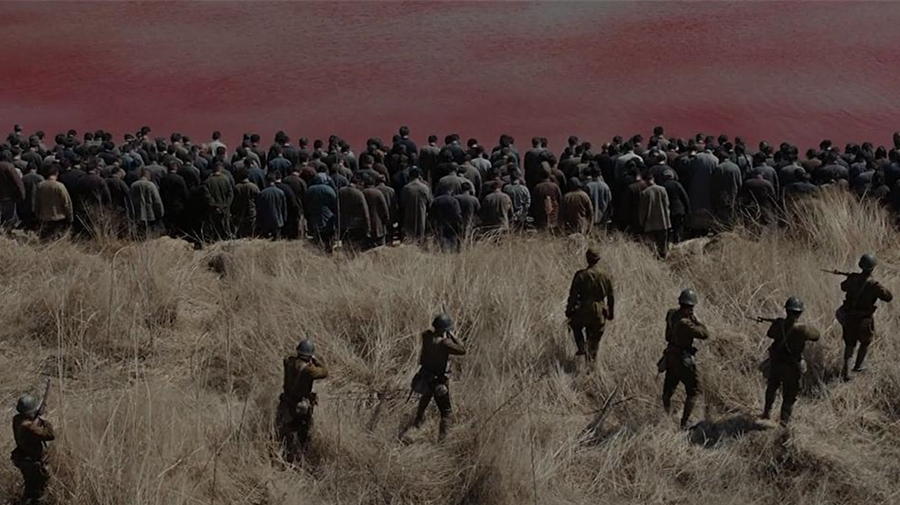Director Shen Ao's new film "Dead to Rights" tells the true story of brave civilians who risked their lives to safeguard crucial photographic evidence of Japan's wartime atrocities during the Nanjing Massacre, defying systematic cover-up efforts and staged propaganda by Japanese forces.

A still from "Dead to Rights." [Photo courtesy of China Film Group]
"On the battlefield where smoke rises from gunfire, we see weapons and bullets. But on the invisible front, another war rages over public opinion, propaganda and culture," Shen said. "On this battlefield, each photo is like a bullet. Opposing forces clash, each advancing their own narratives, until the world finally sees the truth and distinguishes good from evil."
Starring Liu Haoran, Wang Chuanjun, Gao Ye and Wang Xiao, the film is based on documented accounts of Japanese military atrocities during the Nanjing Massacre. The story follows civilians who take shelter in a photo studio and are forced to develop Japanese military film for survival. When they discover photographs from the massacre and the army moves to suppress the evidence, they must fight to survive while smuggling them out.
The narrative is based on the true story of 15-year-old Luo Jin, who in 1938 was forced to develop Japanese military photographs in Nanjing. After discovering images of atrocities, he secretly compiled a set of damning prints into an album and hid it in a temple. His friend Wu Xuan preserved the album, which served as evidence at the trial of war criminal Hisao Tani, one of the primary perpetrators of the Nanjing Massacre.

Shen Ao, director of "Dead to Rights," at the film's Beijing premiere, July 24, 2025. [Photo courtesy of China Film Group]
The true story inspired the 1987 film "Massacre in Nanjing," which later motivated director Shen to create a new cinematic interpretation of these historic atrocities.
Shen, a photography enthusiast who has collected vintage film cameras, learned traditional photo-developing skills in university — a foundation that informed his filmmaking. Intrigued by the photo studio's role in documenting the war crimes, he and his crew spent three years conducting extensive research. They studied archival photos, documents and eyewitness records, including Japanese soldiers' wartime images and American missionary John Gillespie Magee's documentation.
"Photographs, by their very nature, are meant to preserve life's beautiful moments," the director said. "Yet after the Japanese army occupied Nanjing, these same images were weaponized — twisted into tools of propaganda and trophies of conquest."

An IMAX poster for "Dead to Rights." The premium large-format IMAX experience delivers forensic clarity, revealing details from weathered city walls to individual scratches on atrocity photographs, all intensified by immersive visuals and pinpoint sound design. [Photo courtesy of IMAX China]
The film also depicts the Japanese military's "goodwill photos," staged images designed to present a sanitized version of the occupation. The occupiers' grotesque merriment in these photographs stands in chilling contrast to the helplessness and despair of Nanjing's civilians.
"These 'goodwill photos' represent a propaganda battle," the director said. "While we have many films depicting combat, I can't recall any that focus on this information warfare aspect. I want to present a fresh cinematic perspective. Beyond the military actions, the Japanese army also created carefully orchestrated public relations materials in Nanjing to mislead local civilians and international observers. What struck me most was how many of these photos featured children, vulnerable subjects who were easily exploited for such propaganda purposes."
The film has earned an 8.6/10 rating on review site Douban, with audiences responding emotionally to its realistic portrayal of Nanjing's wartime tragedy.
The release coincides with the 80th anniversary of victory in the Chinese people's War of Resistance Against Japanese Aggression and the World Anti-Fascist War. Shen said the film serves to promote "correct historical understanding, opposition to historical nihilism, and strict fidelity to factual records."

The cast and crew of "Dead to Rights" pose for a photo at the film's premiere, themed "every Chinese person will not forget," in Beijing, July 24, 2025. [Photo courtesy of China Film Group]
"I hope the characters in this film can represent Chinese people from all walks of life during this war," he noted. "Countless ordinary individuals never had their names recorded in history textbooks. This film aims to honor them. This wasn't merely a military victory but a triumph of the people. Only through the united will of hundreds of millions of Chinese could this victory be achieved."


 Share:
Share: 




 京公網安備 11010802027341號
京公網安備 11010802027341號